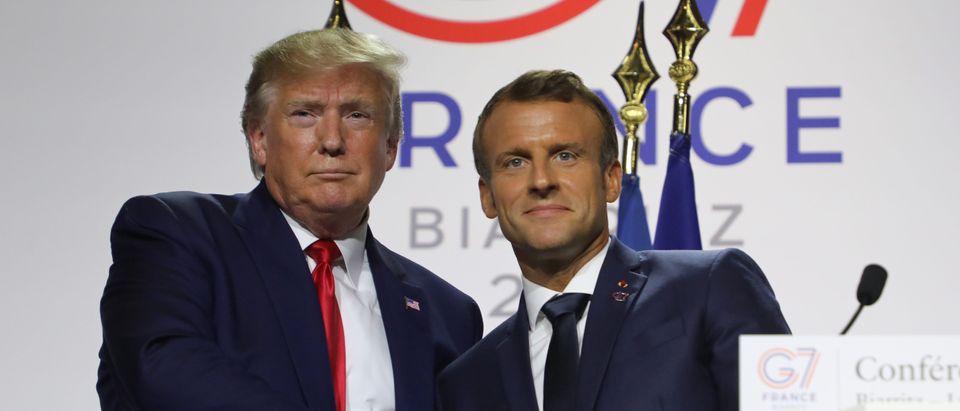NATO is celebrating its 70th anniversary this week. Leaders from the 29 member states will meet in London from Dec. 3-4 to commemorate the occasion. Like many 70 year-olds, NATO has not aged gracefully or been in good health in recent years. Are its ailments terminal — requiring euthanasia — or is a revival feasible? The answers are complicated. Here’s why.
The alliance is in the throes of a crisis. Ahead of the 70th anniversary celebrations, President Emmanuel Macron of France declared, “We are currently experiencing the brain death of NATO.” Macron doubled-down in the face of criticism claiming he was issuing a wake-up call: “Peace in Europe, the post-INF (Intermediate-range Nuclear Forces Treaty) situation, the relationship with Russia, the Turkey issue, who’s the enemy? So I say: as long as these questions are not resolved, let’s not negotiate about cost-sharing and burden-sharing, or this or the other.”
Macron’s “brain-dead” view of NATO is not shared by allies. The sharpest rebuke for Macron was issued by Turkey’s President Recep Erdogan, who said, “I’m addressing Mr Macron from Turkey and I will say it at NATO: You should check whether you are brain dead first.” He continued, “We don’t know what France means for NATO, but Turkey is NATO’s most important member.” Turkey’s foreign minister went further and accused Macron of being the “sponsor of a terrorist organization.”
With such allies, who needs enemies?
NATO’s internal bickering has reached such vicious proportions on the eve of its 70th anniversary that its true enemies will know — even without reading Matthew 12:22-28 or Lincoln’s famous 1858 speech — that “every city or house divided against itself will not stand.”
To be sure, trouble has been brewing for NATO since the end of the Cold War. The alliance’s raison d’etre was to fight the Soviets and provide collective security in the post-World War II era. NATO has been slow to adjust to the new world order and confusion about purpose has translated into poor financial and military commitments by members.
The election of President Trump lit a fuse accelerating what had been a slow burn. Trump publicly chastised member states for free-riding and not spending enough for their security — attacking them for breaching promises to contribute 2 percent of GDP for military spending. His complaints appear to have succeeded in reducing US contributions from 22 percent to the annual common fund to 16 percent, although few states are currently at the 2 percent of GDP target.
Whilst liberals condemn Trump for undermining NATO because he is a soft target, the president deserves kudos for shining light on awkward questions about NATO’s modern relevance. The alliance is founded on vague promises that made sense in the Cold War context. However, as Macron — who, unlike Trump, is the poster-child for multilateralism — noted, there is confusion about who or what NATO is fighting today. The alliance’s key commitment by members is contained in Article 5 of the treaty — “that an armed attack against one or more of them in Europe or North America shall be considered an attack against them all.” In response to an attack, NATO promises to take “such action as it deems necessary, including the use of armed force.”
An “armed attack” in the traditional sense of the term is unlikely in the modern environment. Moreover, if key members are speculating about whether the enemy is Russia, China, or “terrorists” what hope exists that an attack against one will be met with a collective response? If the enemy is terrorism, clearly that collective action has not eventuated nor is it appropriate in a military sense. And many member states, including newer members, do not see China as an enemy at all. Even amongst traditional core members such as Germany and France, there is disagreement about Russia and both these countries have good relations with Putin.
Macron asked last week: “Who is our common enemy? Is our enemy today, as I hear sometimes, Russia? Is it China? Is it the Atlantic alliance’s purpose to designate them as enemies? I don’t think so.” There has been plenty of bluster in response, but these questions have not been answered.
An alliance that knows not what it fights for or who it is against needs to significantly reorient itself in order to be relevant. Taking cheap shots at Trump for revealing that NATO is bereft of clothing will not alter that reality.
Under ordinary circumstances, mercy killing might have been the solution. Unfortunately, Putin would like nothing better than for NATO to collapse. Whether ill-defined or not, NATO represents at least a weak constraint on his ambitions — this is preferable to no constraints.
Trump’s criticism has prompted much needed reflection about NATO’s purpose and strategy. Now he should seize the opportunity presented by NATO’s 70th anniversary in London this week to lead the organization’s modernization to guarantee collective security for the Western world. Trump should bring Turkey to heel, and redefine NATO’s mission to protect against new threats including cyberattacks against critical infrastructure, state-sponsored terrorism, and space warfare.
Absent harsh medicine, NATO is likely heading into a coma. Even Macron can see that.
Sandeep Gopalan (@DrSGopalan) is vice chancellor at Piedmont International University in North Carolina. He was formerly a professor of law and pro vice chancellor for academic innovation at Deakin University in Melbourne, Australia. He was also co-chairman or vice chairman of American Bar Association committees on aerospace/defense and international transactions, a member of the ABA’s immigration commission, and dean of three law schools in Ireland and Australia. He has taught law in four countries and served as a visiting scholar at universities in France and Germany.
The views and opinions expressed in this commentary are those of the author and do not reflect the official position of The Daily Caller.












